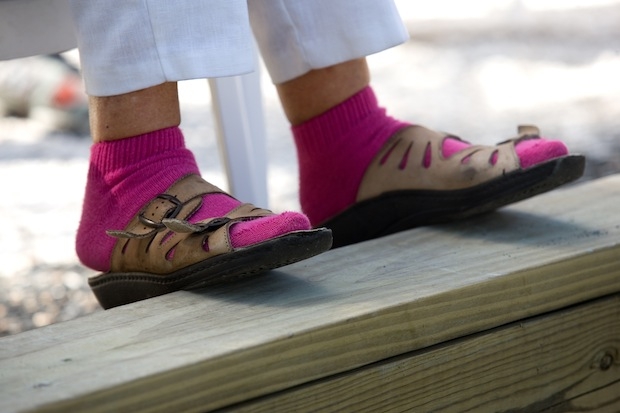Just before I left Gstaad for the Greek islands I went to dinner at Eugenie Radziwill’s, whose other guests included the great Barry Humphries and his wife Lizzie, and a couple I had never met before but whose name rang a distant bell, John Sutherland. The bell turned out not to be so distant, the prof having reviewed a book for the Speccie just that week. I was late as usual and when introduced to Susan Sutherland I made the gaffe of asking her whether the professor was her father or her husband. She was an English rose type, very pretty, and smilingly she said, ‘He is my husband’ — without making a face over my rudeness. Her hubby seemed amused and we got along swimmingly at dinner. After drink took hold, I told him that if all left-wing academics were as nice as he, I’d tolerate even Hush Puppies, but never socks and sandals, or something as stupid as that which will not be retained in his memory bank.
Barry Humphries is on a sticky wicket, as they say in dear old England. Importing people who know the difference between Rambo and Rimbaud can be as dangerous as reading rather than counting in Gstaad. Money counts a lot here, and lotsa money counts a hell of a lot more. Yes, once upon a time Gstaad was a foreign writers’ colony, mostly American, but that all ended long ago. So, it was a pleasant surprise to meet someone new, whose wife was beautiful and young and had not been worked over by a plastic hacker. Perhaps it’s the start of something new, and as Cole Porter wrote, I loved the look of her, and the lure of her, and I wouldn’t mind at all to make a tour of her.
And while on the subject of brains while floating on Greek waters, Homer personally identified with his greatest hero, Odysseus, far more than he did with his other characters, and showed him in a better light than later tragic poets did. I was given a rare book of Sophocles for my birthday, and old Soph describes the King of Ithaca as hard and of base morality. Ouch! He also says Odysseus was the illegitimate son of Sisyphus, and only brought up by Laertes. Euripides tells us in Iphigenia in Aulis that Odysseus pressured for the sacrifice of Iphigenia, whereas Agamemnon and Menelaus and Achilles tried to save her. According to the Greek professor Panos Sykiotis, Homer saw himself and Odysseus as the ideal Greek man, succumbing to the same ambivalences and the same contradictions of his own psychic condition. Now I’m getting myself in deep waters, as they say, but being Greek I’m going to get out of them by steering clear of the storms in Homer’s soul. It’s very simple, really. Homer makes plain that Odysseus’ faults are those of the gods and oracles. What could be easier than that?
What I find interesting is how the later tragic poets turned on Odysseus, whereas Homer showed him in a brilliant light, upstanding and virtuous and beautiful in body and soul. But that’s what history does to heroes. Sophocles and Euripides judged him with later mores, and at the time they wrote the gods of Olympus had lost some of their godliness. In The Trojan Women, Euripides shows the cruelty of the Greek victors when they divided the aristocratic Trojan women among them as slaves. Lucky Greeks. Andromache, Hector’s beautiful wife, was given to Neoptolemos, son of Achilles. Hecuba, wife of King Priam, goes to Odysseus, not a great prize in my opinion, as she’s already old. Polyxena, another daughter of Priam, is sacrificed on the tomb of Achilles, a great waste according to another tragic poet, Taki. Agamemnon got Cassandra, but a lot of good it did him. Menelaus, of course, got Helen back but a cuckold is a cuckold and the King of Sparta is the greatest cuckold of them all. (Mind you, if, as Homer tells us, she was the world’s most beautiful woman, I’d have taken her back in a jiffy also, and to hell with the horns on my head.)
And so it goes while I sail on. We Greeks are down and out right now, but there are still a few seconds left before the referee counts to ten. When in trouble, think and dream about the past. Back then we were number one, in everything come to think of it. There were no gruesome, soulless, untalented hustlers like Jay-Z, no punk rockers, no TV vulgarians like Jonathan Ross. Sure, we were a bit tough on people who were born on the wrong side of the tracks, but no one’s perfect, as Socrates should have told us. My great hero was a real person, not a mythological one: Cimon, son of Miltiades, victor of the battle of Marathon. Cimon had his cake and also ate it. He was a real stud, serviced everyone and was madly loved by his wife. He, too, ended up in exile like his old man. Greeks have a tendency to do that sort of thing, get rid of what’s good and keep what’s rotten and corrupt. Themistocles won the battle of Salamis and was shown the door. Since 1974 the two same parties have shared power and have stolen the country blind. The King, who was the first to move against the colonels, was also shown the door and his property stolen from him by the state. Go figure, as Homer never said.







Comments